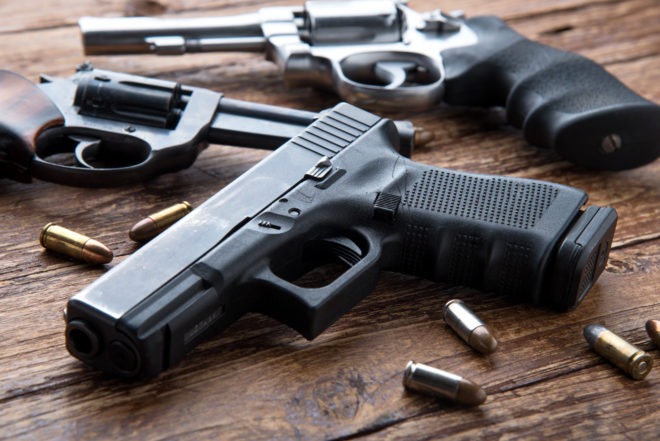

Call Attorney Marni Jo Snyder 24 Hours / 7 Days:
215.515.3360
Gun charges in Philadelphia are especially serious offenses. They are almost always graded as felonies and carry harsh penalties. In Pennsylvania, there is no mandatory minimum for illegally possessing a firearm, but state sentencing guidelines usually recommend jail time—even for first offenses.
One exception in PA, is that there are mandatory sentences when a gun is illegally transferred (sometimes called “straw purchases”) and then the firearm is used as a weapon. In the federal system, penalties are even more severe, with mandatory minimum sentences in many cases.
A gun charge attorney’s role is to work toward a favorable outcome—whether that means a dismissal, acquittal, reduced charges, or lighter sentencing. Defense lawyers can fight back against firearms allegations, and there are several strategies that may apply depending on the case.
Below are seven common defenses a Philadelphia gun crime lawyer may use in court.
If the firearm was used in response to a legitimate threat, self-defense could be a valid defense. The defendant must have reasonably believed it was necessary in that moment to protect themselves or another person, and the force used must have been proportional.
Pennsylvania’s “Castle Doctrine” expands these protections, allowing individuals to use deadly force to defend themselves inside their home. Even in cases where a prohibited person (such as a felon) briefly used a firearm in self-defense, courts may consider the circumstances if the use was temporary and solely to prevent harm.
For a free legal consultation, call 215.515.3360
The Fourth Amendment protects individuals from unlawful searches and seizures. If police discovered the firearm without a valid warrant, probable cause, or legal justification, your Philadelphia gun crime lawyer can seek to suppress that evidence.
This may apply to traffic stops, stop-and-frisk encounters, or searches of homes and vehicles. If the search went beyond what was legally permitted—or if chain of custody rules for the weapon were ignored—the gun may be excluded from trial. Without that evidence, the prosecution’s case can collapse.
Prosecutors must prove that the defendant knowingly possessed the firearm. It is not enough to show proximity to a weapon. For example, if a gun is found in a shared car or apartment, the prosecution must demonstrate that the accused knew the gun was there and intended to control it.
A criminal defense attorney may argue that someone else owned the firearm, or that the defendant had no intent to use or exercise control over it. Without proof of what is referred to as “constructive possession,” charges may not stand.
Remember, to beat a constructive possession charge, you may need to show:
If the defendant had a valid license to carry or fell under one of Pennsylvania’s statutory exceptions, the possession may have been lawful. For example, individuals can legally transport firearms to and from a gun range, a place of purchase, or a repair shop.
Certain professionals—such as law enforcement officers—are also exempt from restrictions under specific circumstances. Demonstrating that one of these exceptions applies can be an effective way to fight a gun charge in Philadelphia.
To convict on most Pennsylvania firearms offenses, the Commonwealth must prove that the weapon was a functioning firearm. Charges like VUFA §6108 (carrying a firearm on the streets of Philadelphia) or §6106 (carrying without a license) require that the weapon be operable. This defense does not apply to all statutes—for example, Felon in Possession (§6105) does not require operability.
If testing reveals the weapon was broken, altered, or actually a BB or airsoft gun, it may not meet the statutory definition of a firearm. In some cases, testimony without physical evidence of a working gun may not be enough to prove guilt beyond a reasonable doubt.
Entrapment occurs when law enforcement persuades someone to commit a crime they otherwise would not have committed. This defense is most relevant in undercover gun stings or firearm transactions arranged by police.
To succeed, the defense must show that the government initiated the crime and that the defendant was not predisposed to commit it. While difficult to prove, this argument can be powerful if the evidence shows law enforcement crossed the line.
The prosecution must prove guilt beyond a reasonable doubt. A gun charge attorney may attack the reliability of witnesses—whether civilian or law enforcement—by pointing to bias, inconsistent statements, or limited ability to observe events.
Independent experts can also challenge the prosecution’s forensic evidence, such as ballistics, fingerprints, or DNA. Casting doubt on the credibility of witnesses or the reliability of physical evidence can create reasonable doubt and lead to acquittal.
Felony firearm charges in Philadelphia are prosecuted aggressively and often come with the risk of jail time. These cases are stressful and complex, but defendants must remember they have rights and options.
Every case is unique. Gun statutes can be highly technical, and even small details may create opportunities for a strong defense. A skilled gun crime lawyer will investigate thoroughly, challenge weak evidence, and develop strategies tailored to the facts.
Although gun charges are serious, there are many ways to fight back. The right defense lawyer can make all the difference in protecting your future.
Are you or a loved one charged with a firearm offense? Schedule your free consultation with our proven criminal defense attorneys at the Law Offices of M.J. Snyder, LLC by calling 215.515.3360 or contacting us online today. We can thoroughly investigate your case, explain your options, and fight for the best possible outcome.
Call 24/7: 215.515.3360
Email: info@snyderlawyer.com
Fax: 215-376-6981
This website is for general informational purposes only. The act of sending an e-mail to the Firm or any attorney at the Firm, or submitting a form response or other materials through the website, will not create an attorney-client relationship. The only way to create an attorney-client relationship with the Firm is through a written agreement.Read More